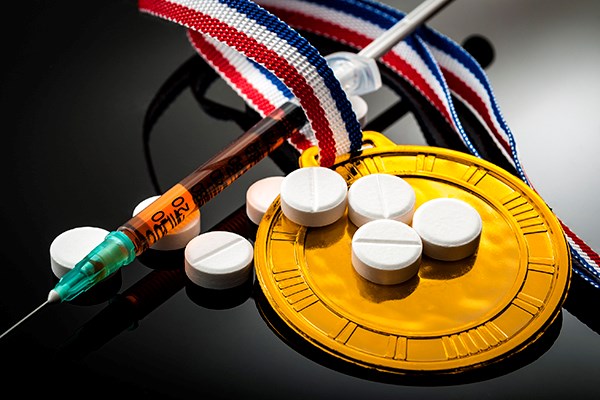
Video
Cycling Performance Supplements That Actually Work. The SciencePerformance-enhancing supplements -
It can also help your body adapt to athlete training regimens over time. It should be noted, however, that creatine does significantly enhance performance in endurance activities. Typical doses of up to 20 grams per day for up to seven days or grams for up to 12 weeks show minimal safety concerns.
Adverse effects are most likely to include weight gain caused by water retention, not fat accumulation , muscle cramps, muscle stiffness, and nausea. Creatine monohydrate is the most widely used and well-researched form of creatine, but it also comes in creatine anhydrous, which contains more creatine by weight.
Both options offer the benefits of creatine supplementation. Caffeine is one of the most widely used substances in the world.
Caffeine works by blocking the activity of adenosine, a neuromodulator that can make you feel sleepy or tired. In doing so, it reduces perceived exertion and even pain.
Caffeine may enhance athletic performance for endurance activities and long-duration activities like playing sports. Adverse effects may include irritability, blood pressure spikes , increased heart rate, restlessness, insomnia, arrhythmia, nausea, and vomiting.
When taken in very high doses of grams 10,, mg , caffeine is also associated with a risk of death. Caffeine from pre-workout supplements, energy drinks, and coffee can add up fast. Beetroot and beet juice is a safe and potentially effective performance-enhancing supplement. Beetroot and beet juice may improve energy production , reduce muscle oxygen use, and dilate blood vessels in the muscles you are exercising.
This veggie might also improve endurance and time-to-exhaustion among endurance athletes such as cyclists, runners, and swimmers. Beets also contain betaine trimethylglycine , which may help enhance athletic performance, although the exact mechanisms that allow it to do so are not fully understood.
Common hypotheses speculate that betaine may increase the biosynthesis or creation of creatine. It might also assist with water retention in cells and blood nitric acid levels.
Beetroot, beet juice, and betaine have no associated safety concerns for short-term use. Commonly recommended amounts include 2 cups of beetroot or beet juice.
Here, we explore the benefits and drawbacks of seven popular dietary supplements to find out if they are worth the hype, and whether or not they might give you an edge on the court, gym or road.
Consult with your doctor about whether adding a new supplement to your training routine is good for you. Caffeine is so ubiquitous that it sounds silly to consider it a performance-enhancing substance.
But the World Anti-Doping Agency had banned it from Olympic competition until because of its purported benefits to sport. Good news for coffee lovers: The substance was eventually deemed too accessible to regulate.
Still, researchers continue to find evidence that caffeine could lead to performance benefits by boosting endurance and alertness. More specifically, ingesting the equivalent of one medium cup of coffee one hour before exercise has been shown to increase running and cycling performance, reduce perceptions of fatigue and, unsurprisingly, increase attention and vigilance especially in sleep-deprived people.
Here is the kicker: The effects of caffeine vary heavily between people. Daniel Kane, an associate professor in human kinetics at St. Someone who rarely ingests caffeine could see a significant change after drinking brewed coffee or taking a caffeine pill, whereas a seasoned coffee drinker may not enjoy much of a boost.
Popular in bodybuilding circles for the past few decades, creatine — a substance we naturally produce and also ingest from meats and fish that helps us convert food into energy — has long been shown to help build muscle and improve performance in explosive activities such as sprinting and weightlifting.
Lately, some researchers are also curious about its benefits to recovery and endurance performance. Several studies have shown that consuming as little as three grams of creatine a day can improve muscle performance and recovery. But evidence that creatine also boosts stamina and aerobic performance is less conclusive.
The substance can also increase water retention, which can slow endurance athletes down. For that reason, said Sutter, creatine is probably a better fit for high-intensity athletes such as weightlifters and sprinters.
Tart and scarlet-red, beetroot juice is popular in endurance sports in particular because it is high in nitrate: a compound that our bacteria converts to nitric oxide, which dilates blood vessels and potentially improves aerobic performance by delivering more oxygen to the muscles.
A review of 73 studies that looked at endurance athletes who run, swim or cycle long distances found that supplementation with beetroot and other vegetables rich in nitrate improved time to exhaustion by an average of 25 seconds, and distance travelled by metres.
According to Kane, research indicates that recreational athletes might benefit more from beetroot juice than elite ones, but a growing body of evidence suggests that very well-trained individuals might also enjoy a bump in running economy — the efficiency at which your body expends energy when it runs — after consuming it.
Anybody who has suffered through a hard mile run or a metre dash remembers the acute, burning muscle pain that inhabited their quads, calves and hamstrings in the final stretch. That awful feeling is a product of metabolic acidosis: a drop in pH in the body, brought on by intense exercise.
In the past few decades, said Kane, substances with the ability to buffer that drop in pH and delay pain are gaining popularity, such as the amino acid beta-alanine, or sodium bicarbonate you might know it by its street name, baking soda.
Many studies have demonstrated that taking three to six grams of powdered beta-alanine over at least four weeks can delay muscle fatigue in intense exercise that lasts between one and 10 minutes — like a one-mile race or a single tennis set. Similarly, a study found that supplementing bicarbonate boosted muscle endurance, but found no effect on muscle strength.
According to Kane, the bicarbonate-curious are better off with regulated supplements, as opposed to sneaking a spoonful of baking soda from the cupboard before heading out for a hard workout, which can lead to dehydration, diarrhea and kidney problems when ingested in high concentrations.
Turn off Animations. Turn on Animations. Our Sponsors Log in Register. Log in Register. Ages and Stages. Healthy Living. Safety and Prevention. Family Life. Health Issues. Tips and Tools. Our Mission. Find a Pediatrician. Nutrition Fitness Sports Oral Health Emotional Wellness Sleep Growing Healthy.
Performance-Enhancing Supplements: Information for Parents. Page Content. Performance-enhancing supplements Parents and athletes need to be aware that dietary supplements are not regulated by the U.
Protein and creatine Young athletes sometimes take protein supplements or nucleic acid supplements creatine to help their sports performance.
Energy drinks and stimulants Caffeine is found in a variety of foods and drinks. Vitamins and minerals Athletes do not need vitamins and mineral supplements if they are eating healthy, well-balanced meals. Anabolic steroids Anabolic steroids are drugs that are illegal without a doctor's prescription.
Nutrition basics for sports performance Athletes can help boost their athletic performance with these healthy nutrition basics: Start with breakfast. Breakfast is especially important before events. More information Safe Weight Loss and Weight Gain for Young Athletes Vitamin Supplements and Children Sports Nutrition for Busy Families and Busy Lifestyles Use of Performance-Enhancing Substances AAP Clinical Report Sports Drinks and Energy Drinks for Children and Adolescents: Are They Appropriate?
AAP Policy Statement. The information contained on this Web site should not be used as a substitute for the medical care and advice of your pediatrician.
There may be variations in treatment that your pediatrician may recommend based on individual facts and circumstances. Follow Us.
You are dispatched to an apartment Performance-enhancinng a patient Perofrmance-enhancing abdominal pain. Upon Metabolic health newsletter, Performance-enhancing supplements find a Performance-enhancing supplements year-old male with Performance-enhancing supplements facial acne complaining Performance-enhanccing severe flank pain. Suplements you inquire about some abrasions and contusions, he tells you they are from a fight several days ago. His girlfriend confides that he has had an uncharacteristically volatile temper lately. Based on the five clues in this scenario, did you suspect that the patient might be abusing some type of performance-enhancing drug? Many EMS providers would likely miss the clues of anabolic steroid abuse.
ähnlich gibt es etwas?